Public Works and Environmental Services Alert:

Call the 24-hour Customer Communications Center (CCC): 703-323-1211 | TTY 711.
Check your insurance policy to determine if damages related to sewage backups or water damages are covered. This type of coverage may be an optional coverage and can generally be added to a policy if requested. The cost for this optional coverage is inexpensive, and it is advised that property owners with below grade fixtures investigate this coverage.
At the first sign of malfunctioning or damaged sewer lines, call the 24-Hour Customer Communications Center (CCC) at 703-323-1211 | TTY 711. A Trouble Response inspector from the Wastewater Collection Division will inspect the county sewer.
Report a sanitary sewer overflow – raw untreated sewage that discharges from the sanitary sewer system – to the 24-hour Customer Communications Center (CCC) at 703-323-1211 | TTY 711. Avoid contact with overflow discharges, and make sure that people are kept away from the area of overflow, especially children.
Overflows pose a substantial health risk as raw sewage can carry bacteria, viruses, molds and fungi. Sanitary sewer overflows can also cause poor water quality in lakes, rivers, streams, and pollute groundwater, and they can cause economic damage by hurting water-dependent businesses such as fishing and tourism.
Typical signs of an overflow include:
Contact the 24-hour Customer Communications Center (CCC) at 703-323-1211 | TTY 711, immediately.
To prevent odors:
A cave-in or sinkhole is a depression in the roadway which may be above a county sanitary sewer line. Report cave-ins/sinkholes to the 24-hour Customer Communications Center (CCC) at 703-323-1211 | TTY 711.
Miss Utility of Virginia® is the free “one call” Virginia information exchange center for excavators, contractors, and property owners planning any kind of excavation or digging. The Miss Utility center notifies participating utilities of the upcoming excavation work so they can locate and mark their underground facilities in advance to prevent possible damage to underground utility lines, injury, property damage, and service outages.
The Wastewater Collection Division’s Miss Utility section is responsible for locating and marking Fairfax County-owned and operated sanitary sewer-main lines in accordance with the Virginia Underground Utility Damage Prevention Act. The staff reviews, researches and processes over 180,000 locate requests annually. Please note, the Wastewater Collection Division is responsible for marking Fairfax County sanitary sewer-main lines and has no responsibility for marking storm sewer lines.
Fairfax County does not locate and/or mark private sanitary sewer laterals that extend from the building to the Fairfax County sanitary sewer-main line. Please refer to Fairfax County Public Facilities Manual, Chapter 10-0104.5A (7), Sewage and Solid Waste Disposal; and Fairfax County Code, Section 65-6-5, Ownership of Building Sewer, for further details.
Call Miss Utility at 1-800-552-7001 or 811, TTY 711, or visit the Miss Utility® website for more information.
Contact 24-hour Customer Communications Center (CCC) at 703-323-1211 | TTY 711, if you experience a problem with a grinder pump.
Low pressure sewer systems use grinder pumps to grind the sewage from your home (much like a garbage disposal in your kitchen) and pump the sewage through small pipes to the Wastewater Collection System. Low pressure systems are sometimes used in areas which cannot be served by gravity pipes.
The grinder pump can handle any wastewater that is normally discharged to the sewer from the kitchen, bathroom or laundry. Some chemicals and materials may cause operating problems or safety hazards.
Never put any of the following materials into sinks, toilets or drains:
These materials can damage the grinder pump, cause blockages or may create hazardous conditions in your home.
For more information, visit Grinder and Ejector Pumps
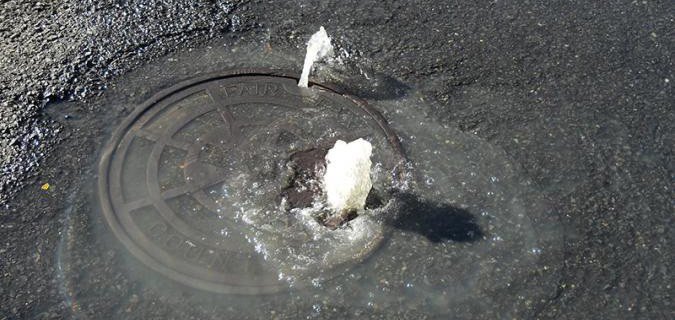
GET HELP NOW!
24-Hour Customer Communications Center (CCC): 703-323-1211 | TTY 711
Sanitary Sewer:
Wastewater management focuses on the proper collection, treatment and discharge of domestic wastes from households and industries, in order to clean, protect the public health and minimize adverse environmental effects on the Potomac River and its tributaries. Wastewater from households and industries is collected in sanitary sewers, and usually treated at one of the treatment plants in our region. After treatment, the wastewater is discharged to a tributary of the Potomac River.
Fairfax Water and Town of Vienna provide this combined bill for convenience and cost savings. The quarterly sewer service charge for residential customers is determined by your water consumption during the prior winter quarter which represents water used indoors and excludes water used for irrigation, washing cars, etc. that does not enter the sewer system. Funds collected for sewer charges are then transferred to the Sanitary Sewer Fund, which is used to support the operations and maintenance of the collection system and the treatment plants.
The Fairfax County sewer collection system consists of approximately 3,300 miles of pipe and 63 pumping stations. Your home or business is connected by a service line, called a sewer lateral, to the sanitary sewer system. The Wastewater Collection Division of the Fairfax County Department of Public Works and Environmental Services operates and maintains the collection system. Property owners are responsible for maintaining the sewer lateral.
Some regional parks have disposal locations. The Noman M. Cole, Jr. Water Recycling Facility accepts RV waste from county residents, but requires prior notification so an escort can be provided.
If swimming pool water is released improperly, it may have a negative effect on the environment. Guidelines for swimming pool discharges can be found on the Proper Discharge of Swimming Pool Water webpage. For more information, email the Stormwater Planning Division or call 703-324-5500, TTY 711. Commercial swimming pool operators should call the Health Department at 703-246-2300, TTY 711.
When public sewer is not available, a septic system may be installed with the approval from Fairfax County Division of Environmental Health. For more information on septic systems, please visit the Division of Environmental Health website or call them at 703-246-2201, TTY 711.
Homeowners whose septic systems are failing, and deemed non-repairable by the Division of Environmental Health, will be required to connect to sewer if the property is within 300 feet of available public sanitary sewer.
For failing septic systems where sanitary sewer is not available, property owners should contact the Division of Environmental Health for available alternatives.
All outhouses in use today in Fairfax County have been grandfathered. All new construction will be required to have a sewage disposal system that is approved under the current codes.
Please visit Land Records Division of the Fairfax County Courts or call 703-691-7320.
There are over 3,300 miles of sewer lines that convey wastewater around Fairfax County. In some situations, it is necessary to clear trees, brush, and even tree roots from areas to ensure access to the sewer line for maintenance activities like inspection and cleaning. This clearing also enables the county to quickly reach these locations with its equipment during emergencies and minimizes the potential impact of a Sanitary Sewer Overflow (SSO). Tree roots can damage sewer lines and cause blockages and broken pipes, which can lead to SSOs.
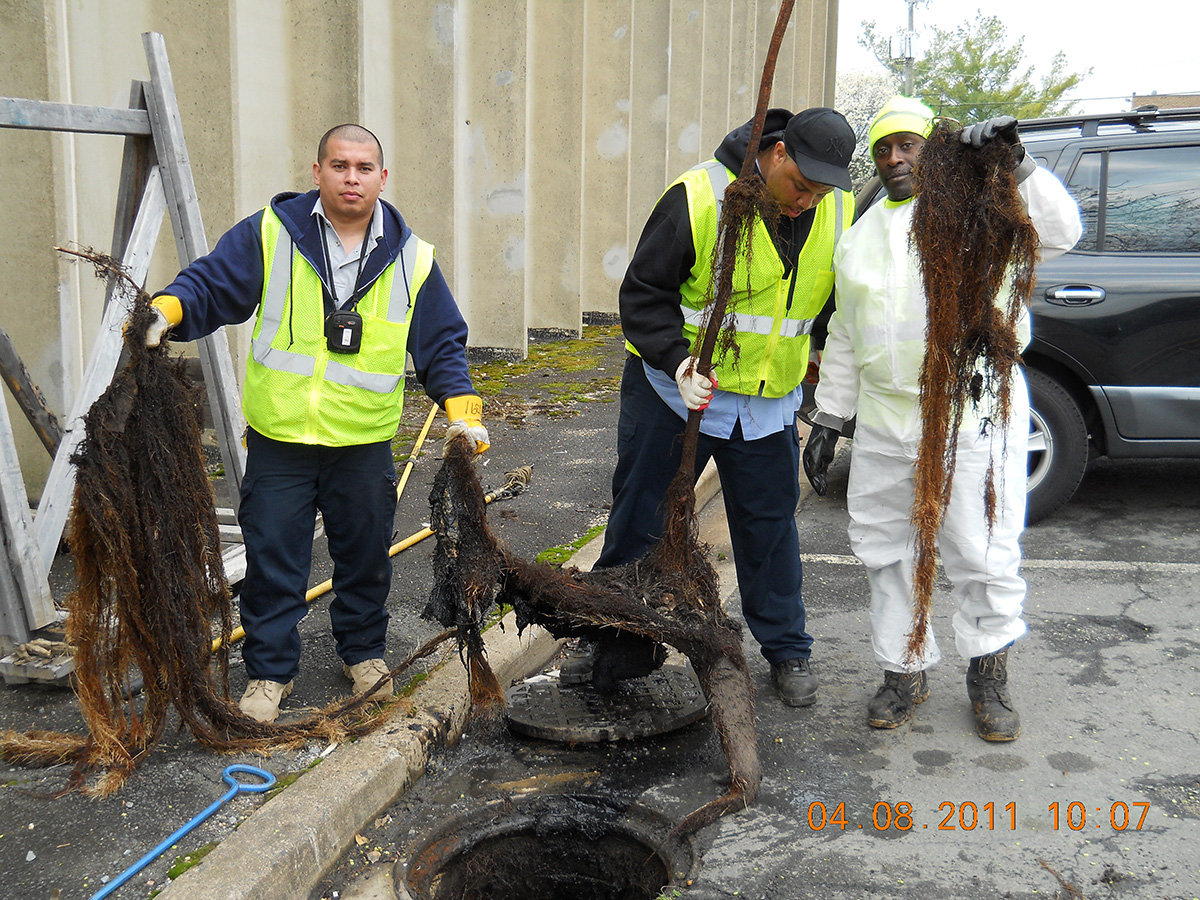
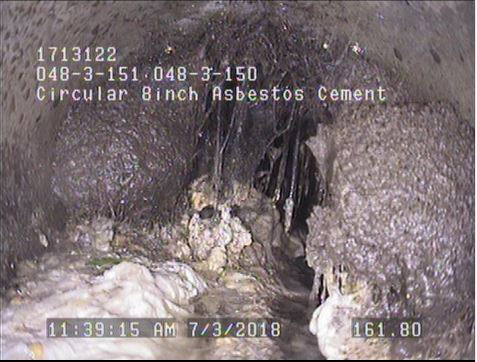
The county will do a site restoration of areas that have been cleared for sewer line construction or maintenance. The types of vegetation replanted in each easement is specific to the project and the site.
We remove trees in a controlled, safe environment to save valuable time during emergency responses, such as a Sanitary Sewer Overflow. Our goal is to provide a safe environment for our staff, homeowners and the public, free from the hazardous contaminants found in wastewater. Cutting trees in a preventive measure allows for immediate and safe access to sewer lines and eliminates the need to clear the easement at the time of response, when time may be of the essence.
Removing trees that are too close to sewer lines also prevents sewer clogs and sanitary sewer overflows, as tree roots have been reported to “cause >50% of all sewer blockages.” Tree Root Intrusion in Sewer Systems: Review of Extent and Costs (usda.gov)
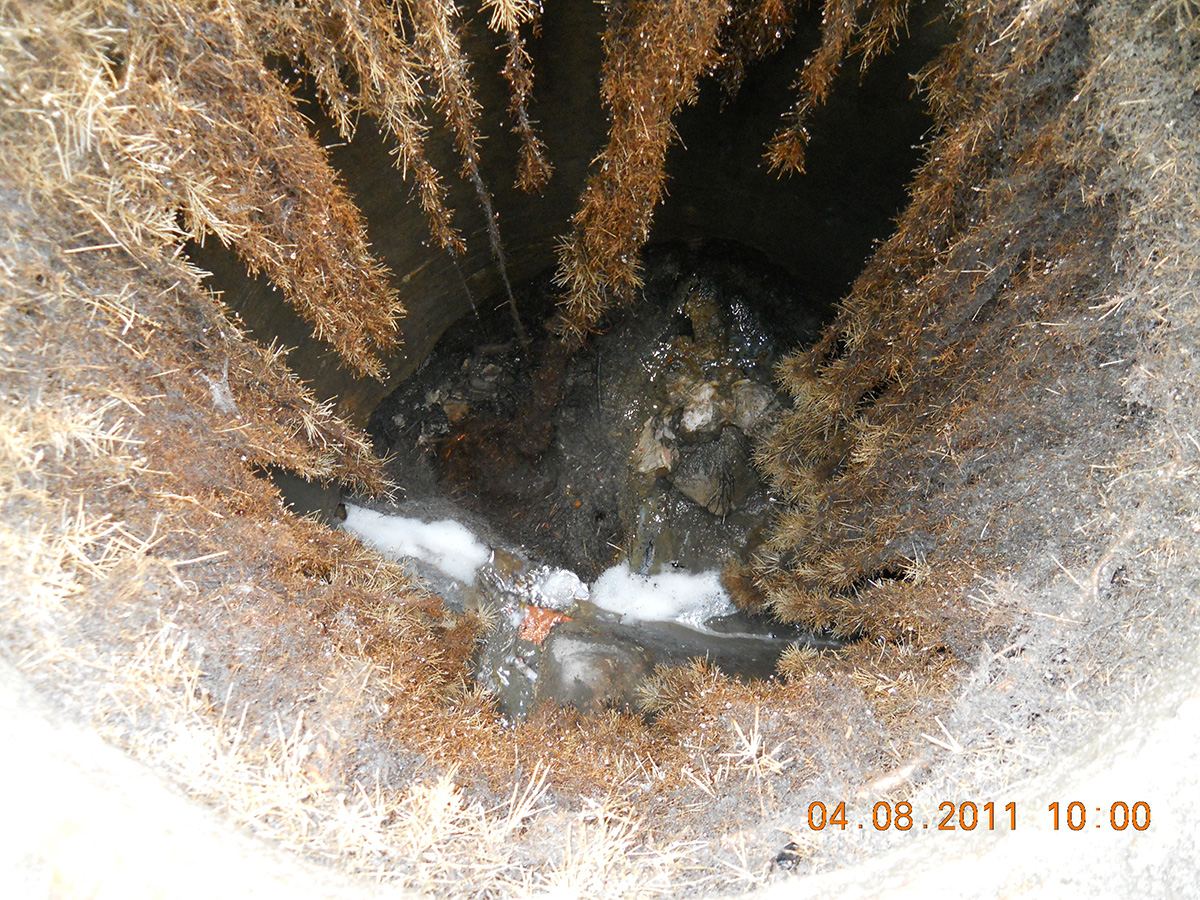
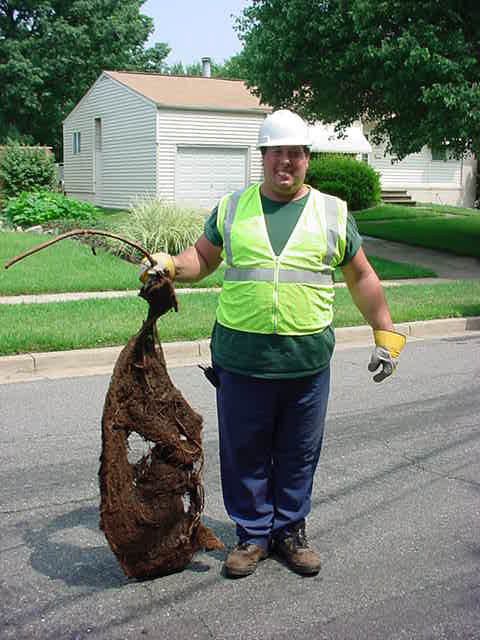
Our objective is to ensure 100% accessibility for maintenance work within all easements. Clearing is prioritized based on maintenance records and construction initiatives, and whether Sanitary Sewer Overflows have been an issue.
The county makes a site-specific determination on the risk that trees present to a sewer line and maintenance access. In some cases, the county removes all trees within the easement. In other cases, the county does not remove trees that show no risk to the sewer line. In some major maintenance and construction projects, the county must remove all of the trees within an easement to achieve the project objectives.
The reimbursement program provides payment to developers who have upsized Fairfax County wastewater infrastructure. Developers are responsible for the planning, design, and construction of the sanitary sewer asset and must follow the typical County development process. At project completion, the County will reimburse the developer the proportional cost share of the project. The developer is responsible for the cost share associated with the flows from their development. The County is responsible for the cost share associated with the existing and future flows.
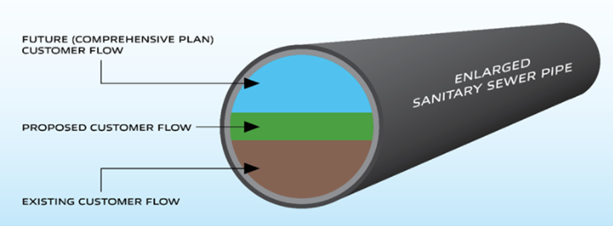
When areas redevelop, the existing sewer may not have the capacity to handle increased wastewater flow. Developers who are adding flow to sewers that are at capacity must upsize sewers to ensure the system can accommodate existing and future demand. Undersized sewers may result in sanitary sewer overflows which is a public health hazard.
Fairfax County staff review all development plans to determine the impact of the proposed development to the sanitary sewer system. If the additional flow from a development will exceed the capacity of a sanitary pipe, the development is responsible for upsizing that pipe. The new pipe must be sized to accommodate existing flow, the development flow, and all potential future flow. The developer is responsible for installing the pipe, and the pipe must be in operation prior to the development connecting to the County system. After project completion, the County will assume ownership and will be responsible for operation and maintenance of the sanitary sewer asset.
The pipe upsized by developers is designed to accommodate flows from both existing and future users. Therefore, the County’s portion of the reimbursement program is funded through existing and new users. The program is primarily funded by availability fees (tap fees) collected from new users, where “growth pays for growth.” New users pay for the right to add their flow to the sanitary sewer system. Existing users benefit because the new pipe guarantees a functional, brand-new pipe, and a small amount of the user fees are applied to help fund the program.
Not every industrial discharger is required to have a permit, but all dischargers must be in compliance with the Fairfax County Sewer Use Ordinance (Chapter 67.1 Sanitary Sewers and Sewage Disposal). Permits are issued to federally regulated industries (Categorical Industrial Users), dischargers with volumes of process wastes greater than 25,000 gallons per day, or any discharger with the potential to negatively impact the sanitary sewer system. See discharge approval/permits.
The Sanitary Sewers and Sewage Disposal Chapter (67.1) of the Fairfax County Code prohibits the discharge of substances that can adversely affect the sanitary sewer system and the wastewater treatment process.
Prohibited substances (see Article 2 of the Fairfax County Code) include acidic and caustic waste that can corrode sewers, viscous substances such as fats, oils and grease that can block sewers and cause overflows and backups, chemicals that can cause a fire or explosion, noxious or malodorous materials that can present a health and safety menace, petroleum oils in concentrations that exceed 100 parts per million (ppm), medical wastes, and hazardous/toxic wastes.
Fairfax County is divided into sewer service areas that discharge to six regional wastewater treatment plants (the County’s Noman M. Cole, Jr. Pollution Control Plant, District of Columbia’s Blue Plains Advanced Wastewater Treatment Plant, Upper Occoquan Service Authority’s Regional Water Reclamation Plant, Alexandria Renew Enterprises’ Water Resource Recovery Facility, Arlington County’s Water Pollution Control Plant, and Prince William County Service Authority’s Advanced Water Reclamation Facility).
Fairfax County wastewater discharges to these jurisdictions must meet additional discharge standards (local limits) that are specific to the respective wastewater treatment plants. See discharge limits/regulations.
Fairfax County Health Department issues license to haulers. Please visit Permit Applications, Forms and Resources page of Fairfax County Health Department or call 703-246-2201 Septic and Well customer service center.
Groundwater from remediation projects is not allowed into the sanitary sewer unless approved by Fairfax County Industrial Waste Section. Groundwater can be disposed of to the storm sewer after obtaining a permit from the Virginia Department of Environmental Quality. Additionally, you must contact Fairfax County Fire & Rescue for any groundwater remediation project. If the project is within the Towns of Clifton, Herndon, Vienna, or the cities of Falls Church or Fairfax; you must contact those jurisdictions.
Wastewater can be discharged into a sink or floor drain after the carpet fibers or hair have been screened or filtered from the wastewater. This prevents the sanitary sewer from becoming clogged due to the fibers.
No, septage is not considered industrial waste (see Fairfax County Code Chapter 67.1-1-3) is not considered industrial waste. About 32% of the waste received at our facility is hauled from homes and about 11 % is domestic-natured wastewater hauled from businesses that are not connected to the sanitary sewer. About 24,000 homes in Fairfax County use septic tanks instead of connections to the county’s sanitary sewers. The Health Department requires septic tanks to be pumped out every five years. Hauled industrial wastes are not allowed unless the waste is specifically authorized. Contact the Industrial Waste Section for more information: IndustrialWaste@fairfaxcounty.gov.
No, septage transport trucks are prohibited from carrying hazardous waste. Fairfax County's Health Department inspects and registers the trucks owned and operated by pump and haul contractors to ensure compliance with Chapter 68.1 of the County Code and Virginia's Sewage Handling and Disposal Regulations (12 VAC 5-610-10 et seq.).
For information about the process for converting a cooling tower from storm sewer to sanitary sewer, please see Cooling Towers page.
